This article has been a long time coming.
For the most part, my immigrant friends have been having a grand old time in Taiwan. Not perfect, nowhere is, but I like to say it’s about as perfect as life can be, depending on one’s circumstances, of course.
There’s a loud minority though, and unfortunately like many loud minorities, the media loves to trot out their bad takes, because bad takes generate clicks and outrage, and that means eyes on ads. I’ve resisted writing a post like this because of that, I don’t want to feed the outrage machine, but when articles like this hit the news, written as if there’s some sort of dark secret, as if Gold Card holders are suffering under the (white) burden of how improving Taiwan all on our own, as if people like us have a perspective that Taiwan absolutely must hear at its own peril, I gotta respond. It’s time.
It’s not just Gold Card holders I see this from. Places like forumosa and the Taiwan subreddit are also full of people who frankly I just don’t understand why they live here, considering they have a foreign passport.
Thank you Jonathan G, for giving me a frame against which I can compare how life is actually like for the rich immigrants coming to Taiwan on the Gold Card. I’ll go down the list of these, erm, complaints, and illustrate how things really are, maybe lend some perspective based in reality here.
Part one of this article is a response to Jonathan G’s article, which mirrors similar mindsets (I won’t bother linking the other, uber-toxic ones). Part two is what my experience has been, as a counterpart.
In Response to a Rich Immigrant’s Typical Complaints
We keep reading about all the various foreigners that love Taiwan for its food, hotpot and people. We see all the 15 second Tik-Toks, loud youtubers and attention seeking Instagram accounts but all of that is superficial. Dare I say fake even. What is reality like for Gold Card foreigners in Taiwan?
This is the primary reason I’m going to spend an hour or two putting this all together. The audacity of one rich white immigrant claiming to speak for the rest of us, as if his lived reality, which while valid, is representative. It’s not, and I have the numbers to prove it.
I came to Taiwan from the United States on an economic development Gold Card about 2 years ago
Context: the Gold Card is a new visa in Taiwan that ostensibly is aimed at bringing in highly experienced foreign talent. The economy category is one of many. When Jonathan G came in on that category, it was the most common, as it was a sort of loophole: if you had a monthly salary of $5,500 USD, you were basically guaranteed a Gold Card visa. The loophole has since been closed, insomuch as actual experience in economics is required alongside the requirement. I, as well, am on the economic category, despite being a software engineer. Basically, don’t assume that just because someone is in the economic category, they have any experience in economics. You basically just had to be (relatively) rich.
In the US I am used to owning…. I soon realized that the prices for houses and apartments are, for lack of a better word, unaffordable.
I am confused here. Jonathan claims to be experienced in real estate, dare I say an expert, and yet he is surprised to find housing prices in one of the largest, densest cities on the planet to be high. He claims to own property in the USA, which I believe must be outside a major city and likely in a less-populated state, because that’s the only way he could find the prices here in Taipei surprising. It’s true that the cost of housing in the USA can be low (average is about $350,000), but in any major city in the USA you won’t stay below $600,000 for a house. Housing cost inflation in cities is rapdily outpacing salaries in all developed nations, a well documented phenomena that I am surprised to find is news to a real estate expert. Perhaps if one was a specialist only in places such as Pocatello, Idaho, and utterly unfamiliar with the housing markets of major cities, it would make sense.
For what it’s worth, yeah, Taipei housing costs are high. They’re around $970,000 USD on average right now. Leave the city, and the numbers drop, fast. Yilan, which with low traffic is about a 30 minute drive through a tunnel to Taipei (high traffic can get up to 2 hours), you can get a 100 sq meter apartment for around $530,000 USD. Taitung, Taizhong, etc, prices drop precipitously.
So what we have here is someone immigrated into one of the largest cities on the planet, for some reason expecting to find a house under a million bucks. Yeah, I wish prices were lower too, but hell I also wish we abolished private property alltogether so I take a somewhat different perspective on the whole issue ;) Either way, to see a capitalist surprised at this fact is, well, surprising.
Especially when compared to the US. I asked how my local friends can afford their houses and the answers were either with the help of family or banks or that they rent for the foreseeable future.
This is absolutely a problem, not just here but in every city in the world, and local communities should be demanding more of their governments to resolve this issue. Recall, though, that we are immigrants, and I’m not sure why our needs, as rich digital nomads, the 1% of the 1% here, should be considered over those of local recent grads, old people, etc.
I was wrong. I was told by several banks that I would be lucky to get a mortgage and that if I do, the terms would be interest rates over 10% and a duration of 20 years, after putting down at least 40%. Apparently as a foreigner, I am “high risk per the central bank”. How is Taiwan going to settle any foreigner with this banking policy?
Immigrants are high-risk. This is true anywhere. Immigrants in any country are high risk from a financial perspective: they could get deported, have a free pass to leave whenever they want usually, I mean I feel like this should be obvious. Again, I agree that it sucks, though for again, different reasons - I believe borders should be open everywhere, totally. But why is this a surprise, especially to an expert in real estate, and someone with lots of traveling under their belt? Bear in mind that the rates are much better for locals, and also bear in mind the constant financial threat from uber-rich PRC citizens coming in and buying up property. That Taiwan takes measures to defend its citizens from the ultra-rich from other nations exploiting them and their land is admirable. If people like me or Jonathan want the local rates, I figure we should put our stakes in the nation and go for citizenship.
That being said, my Taiwanese friends told me early on that Taiwan real estate rentals are all about “compromise”. My biggest shock was how much landlords charge for rent given how they calculate the size of the apartments. The listed size includes as much as 50% of common areas or balconies that are inaccessible or patios that do not open up not to mention the elevators, hallways and lobby. That’s a big problem.
I’ve heard weird stories like this here and there, but at the end of the day before you rent, you come check the place out and decide if what you see is worth the price tag. It’s not like someone listing the ping (area measurement unit) incorrectly actually hurts you, beyond wasting your time on a viewing.
To talk about the positives of the renting in Taiwan, though, which should be impossible for a dirty communist like me: the rental protections are pretty intense here. Far better than the USA. The government banned evictions during COVID, for example. I’ve encountered landlords voluntarily reducing rent to businesses and residences during COVID, which is not only obviously ethical, it makes obvious sense from a capitalist perspective: might as well get what you can while you can, because nobody’s starting new businesses during COVID. Meanwhile in the USA a lot of my favorite restaurants were forced to close because they couldn’t make rent. According to friends, those units remain empty. Stupidity. Not to mention, in general eviction protections are strong, and the process is lengthy. In short, for an American to move to Taiwan and opining on anything regarding housing is laughable. There are 250 homeless in Taipei’s 2,500,000 large population. Compare to Los Angeles at 4 million people, with 41,290 homeless. Other American cities have similar numbers. In the last year, Conneticut had 16,271 eviction filings. Delaware had 15,114. Indiana had 93,775. Maybe when Americans migrate to other countries, we should try learning, instead of pushing our broken opinions on others?
If you’re smart and want to get around Taipei, the MRT is quite convenient and the way to go. However, if you’re like me
So, not smart? Why’d you give us this layup, Jonathan? lmao
I value my independence and the ability to hop in my vehicle and go. To a restaurant, to another city, to the beach, 2pm or 2am. I value that. A lot. Being an American, that often manifests as owning a vehicle. It is encoded in our DNA.
Ok, no, it’s not. I think we live in different worlds than the author. Very rarely do I hear an American that’s experienced an actual public transit system lament the lack of superhighways and the 40 hour car commute. Groups such as New Urbanist Memes for Transit Oriented Teens show how the younger generations of Americans aren’t blinded by the wool of decades of oil and gas company propaganda on the mythos of American independence requiring a car, and people are clamoring for walkable cities. Not to mention, it’s simply not true that car ownership is encoded into American DNA. Cities like Chicago, NYC, an San Francisco certainly have problematic transit systems when compared to basically anywhere in Europe or Asia, but plenty of people live there their whole lives without owning a private vehicle.
In short, this is in my opinion the most absurd possible perspective to take when immigrating to Taiwan. One would expect to come here to enjoy their remarkable, best-in-class public transit infrastructure, not try to move to one of the most dense cities in the world and immediately buy a Land Rover. If you really want a private vehicle, Taiwan has that figured out too: get a scooter or motorcycle, just like everyone else.
As some might now know, I drive a large vehicle in Taiwan. I learned how to drive with the craziness of the taxis, the scooters, and the buses all around me. It gets very exciting. Especially in alleys around Yonghe. Centimeters literally matter!
Do you understand how this sucks? I hate when I’m trying to enjoy a walkable food lane and a car suddenly is squeezing next to my elbow, knocking over bicycles and shit. It’s hard for a reason, man: You shouldn’t be doing it.
What I was stunned by though was the engine tax. In the U.S., registering a vehicle typically costs about $50 a year. In my case, I am paying 75 times that. The size of engine should not be a penalizing factor, but in Taiwan it is.
Exactly. How else does a city try to reduce its pollution? How else does it try to increase public transit ridership, decrease land wasted on parking, decrease traffic fatalities? He’s right, it’s expensive to own a car in Taiwan, as well it should be. Other countries should follow suit. That someone would come from America, a nation with the most laughable public transit infrastructure in the world, a nation more owned by Oil and Gas than possibly any other other than Saudi Arabia and Russia, and think that anything about our country’s transit infrastructure should be applied to Taiwan, is frankly hilarious.
I mean drive anywhere in the USA and see that not only is it addicted to its cars, it can’t even maintain the infrastructure for them. It lacks the political will, or is incompetent, I mean who knows why really, all I know is that I have motorcycled around this entire country twice, as well as deep into the mountains, and I have never once encoutnered a road as bad as any of the most traveled-on freeways in the USA, whithin which I’ve driven up the entire west coast, from San Francisco to Houston and back, from Houston to Chicago and back, all up and down the east coast… USA roads suck ass.
So in short, Americans, we have nothing to offer Taiwan in terms of transit opinions. Just appreciate that they allow us to enjoy the fruits of their hard work.
Getting my driver’s license was easy. Yours, might not be.
I actually agree that the licensing system is in desperate need of work here. The scooter test is hilariously stupid, and the liscensing system doesn’t seem to be doing anything to prevent some remarkably terrible driving I see when I’m out and about. But I say that with full awareness that the USA system is no better, if not worse: there’s no relicensing requirement in the USA, and the drunk driving rate there is abysmal. At least here, people don’t need a license, and plenty of my friends don’t have one. I only have one so I can motorcycle around :)
However I wish the banks were half as useful as 7–11. This is where we take a trip back to 1980. Everything is manual. Simple things that should take 5–20 minutes in the west, like getting a debit card for the checking account one spent 3 hours opening, will take another few hours if you’re lucky.
It’s worth noting that if you speak Mandarin, the banking process is still annoying, but not nearly as much. This is the one area where I otherwise fully agree: the banking system here is very, very outdated, and its holding itself back in terms of a good experience people could be having with new technologies and the ability of the people to invest their savings. On the other hand, the exploitation of people’s earnings is much harder here. For example, people get actual pensions, instead of the scam of forcing them to gamble their earnings on the market through 401ks. We use to have a pension in the USA too, until that country transformed entirely into a oligarchy. It’s also worth remembering that the financial system here needs a huge amount of oversight to prevent massive infiltration by ultra-rich PRC citizens, or simply CCP sockpuppets, buying out the country from underneath itself.
The most worrying thing I came across in banking is that when I wired funds for my business, it took weeks to arrive in my account as well as numerous calls from the bank asking me about where and why I am sending funds to myself. The reason is that transferring funds from abroad into Taiwan has to get the approval of the central bank.
Another example of the system protecting the country from basically what Jonathan and I are: ultra-rich foreign nationals, whose motives are unknown, and who basically have no stake in the well-being of Taiwan.
On a more positive note, walking out of the bank, I find wireless service to not only be significantly cheaper than the US, I find it more reliable as well.
Unlike countries like the USA and Australia, telecom firms don’t have effective monopolies, and there’s strong consumer protections in place. Unsurprisingly, this results in lower prices and higher quality in service. Again, something we should be learning from them.
At the coffee shop, I start to order things online. there are a few go-to sites and some international providers. However, over time, I noticed some of the sites that deliver from China have slowed delivery or ceased it altogether.
Good, buy local.
I also noticed that ordering items I cannot find in Taiwan has gotten more difficult for unnecessary reasons. I used to order from Amazon but customs adds 33% duty for personal items over $75.
…and? Why is a customs tax surprising? Everyone does it. Don’t want it, buy local.
Now, If Taiwan is really part of the global commerce chain, limits like this should not exist.
Lemme just put my little red pin on here and say no, Taiwan should find ways to maintain and independent supply and commerce chain, because as we’ve learned from Ukraine, it really is important for countries to be able to be utterly self-reliant. Not to mention, global capitalism is a curse of exploitation that serves the interests of 1% of the population.
I know and have spoken to many Gold Carders. Quite a large percentage of them left Taiwan last year when Taiwan went into COVID lockdown. Many have not returned due to the current quarantine policy and or their cumulative experiences.
Some did leave, but in my experience it was mostly COVID refugees that were just here to enjoy life in the only country on Earth to actually nut up and do something about a pandemic. While literally millions died around the world, my rich friends and I could party it up, and unsurprisingly, once the parties started up again back home, a lot of those people left. They won’t come back because of quarantine? Oh well, less than a thousand people died in Taiwan from COVID, and now that the population is nearly wholly vaccinated up, the borders are slowly re-openings. Surprising that pandemics suck, I guess, but at least Taiwan acknowledged this reality instead of pretending everything is ok and letting nearly 1/300th of its population to die.
I wanted to see what other Gold Carders were experiencing. I took it upon myself to conduct a survey and was shocked to see that 49.5% of respondents are thinking of not staying in Taiwan. 78% of those who said they would return to Taiwan, said they would return sooner if allowed to quarantine at home. The most troubling figure from my informal study was that only 27.5% plan on staying in Taiwan in general since only 10% think they cannot have better opportunities elsewhere.
This “survey” was posted and resulted in about 2 days, in the “Taiwan Gold Card Line Group,” an unofficial Line group that in my experience is mostly used to complain about how awful our lives, as rich foreigners, are in Taiwan. I have no idea the number of respondents, but I’m guessing it’s less than the survey done by the Gold Card Office in collaboration with the American Chamber of Commerce, which indicated that of the people that came during the COVID pandemic, only 16% were planning on leaving or had already left. In short, the “survey” was unscientific, biased, self-selected for people in the Line group that enjoy complaining about Taiwan, and should not be considered indicative of any greater pattern.
I worry that if changes are not made, the opportunity that Taiwan has with the Gold Card program will end up as the typical story of westerners come to Asia, are enamored because it’s new, try to settle down but soon find the shine wears off and they leave. I for one do not want to be part of this statistic
Colonial mindset. We are guests. Taiwan has done and will continue to do just fine on its own, according to the will of the people whose roots are here. We have no stake in Taiwan - we have foreign passports. We can flee to the USA at the slightest sign of trouble. The people here have generations of history here, have all their property and assets here, hold no more than the one passport. We should remember that as guests of the country, how lucky we are that the locals invited us in and, shockingly, are willing to hear out opinions like this with a remarkable patience.
For the summary:
- Setup streamlined banking.
I agree, for locals. Rich immigrants should still be strongly monitored. Our motives are unknown and we are high-risk.
- Provide incentives to purchase properties (at least equal to locals).
Disagree. Immigrants should be required to put their necks on the line if they want to take property opportunities from locals, just like the locals have to.
- Reduce the red tape and overhead in owning a business.
This wasn’t addressed much in the article beyond the issues with moving money around, but it would be nice if it was actually easier to hire locals through a Taiwan subsidiary. I tentatively agree.
- Revisit vehicle registration taxes
I agree, it should be even more expensive to own a private vehicle in Taiwan, and the money should be put towards improving the transit system even further, particularly in servicing more remote locations and tribal townships. I have faith Taiwan will figure this out in the best way for itself though, as it always has.
My Experience, as a Rich Immigrant
My background: I lived in Taiwan in 2013-2014 for one year as a member of the AIESEC national committee, then as an English teacher. I returned in January of 2020 as a Software Engineer, a plan I always had that was made a hell of a lot easier by the Gold Card visa, and a date that was set before the COVID pandemic happened. I say that as I resist mildly the label of “COVID Refugee,” though I readily admit that my life benefited greatly by the admirable response Taiwan took to the COVID-19 pandemic. I’m on the Gold Card under the economic category as my salary at the time was $140,000 USD/year. Now it’s around $200,000 USD/year. I work USA Software Engineering contracts and bill everything through the USA and my bank accounts there, and will thus be filing taxes both in Taiwan and the USA (this will be hard to figure out, but so it goes). I’m a white guy, native English speaker, and my Mandarin is passable, a solid intermediate level.
Rather than go through a laundry list of things I think Taiwan “needs” to change or improve on, let me instead share the gifts that Taiwan has given me, by allowing me to come live here.
Environment
Taiwan is green. The jungle abuts the city in a 30 foot wall of fecund growth. Throughout the city, roofs are covered in plants, alleys are lined with plants, and there are parks on practically every corner.
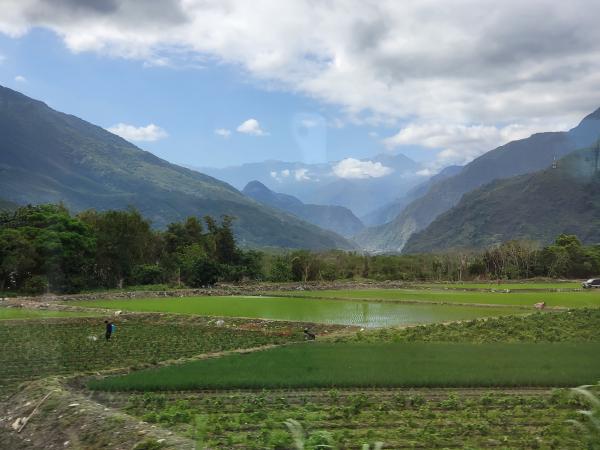
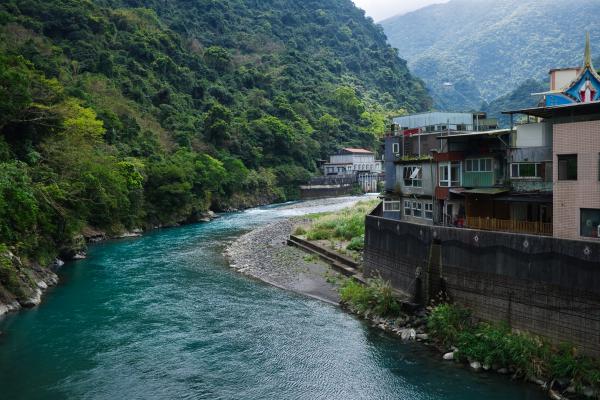
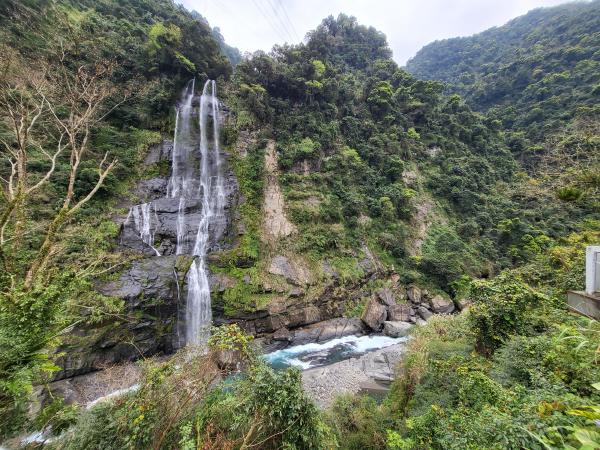
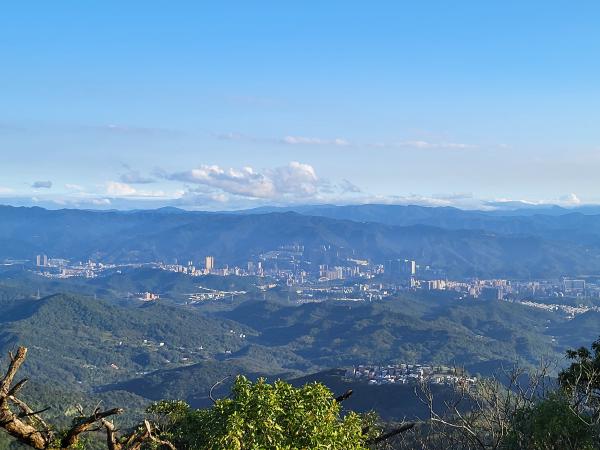
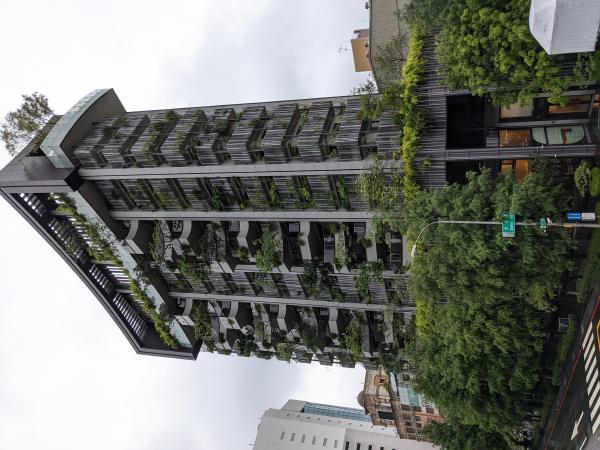
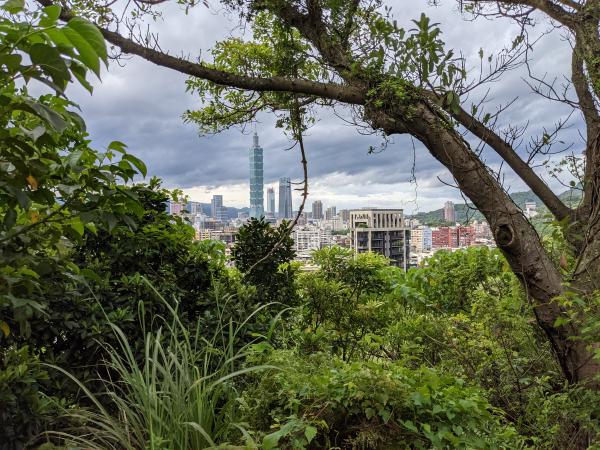
As a child of suburban America, I love how I can just walk from my apartment, pick up a lunch somewhere, and then sit in a park and enjoy it. The other day Tammy and I were chatting about how some abandoned building near our house would always be full of teenagers if it was in either of our hometowns back in the USA, and wondered why that wasn’t the case here. I think the reason is because the parks here are open 24/7, and there are many other places for young people to hang out after school or on the weekend, such as riversides, without being bothered by the cops. It’s a country that promotes going outdoors and enjoying their natural resources and environment.
On any given weekend, our activities have included:
- Riding a bus 1.5 hours to Wulai to swim in the crystal-clear river and hop in and out of the natural hot spring
- Riding a train 30 minutes to Gold Mountain to hike remarkably intense terrain
- Riding a train 1 hour east to Fulong to ride rented bicycles (~2 USD/hr) along the oceanside, and then swim at the beach
- Riding a Ubike (city rental bike system) along any one of the many riversides' well-paved roads
- Picnicking in any one of the massive parks in Taipei
- Picking up food at a nightmarket to enjoy at the riverside
As I think back on my experience of 25 or so years living in the USA, it’s not like I wasn’t able to enjoy some of the above activities, it’s that it took tremendous effort, planning, and time, and worst of all, you basically had to have a car. All these sorts of activities are available to everyone in Taiwan. The public transit is cheap and accessible, and if you’d like can be paid entirely in cash with no ID requirement (a common barrier to many activities in the USA). Sure, I miss Yosemite, but I don’t miss the three hour drive there, and I especially don’t miss the 5 hour drive sitting in traffic on the way back. I don’t miss the hundreds of miles of grey pavement that was almost the entirety of Houston, the little bit of scrubland out by NASA with dirt trails from which you can hear the freeway anyway.
Transit and Infrastructure
I’ve written about this before, but in my opinion Taiwan has the best public transit system in the world. Some would argue that perhaps Japan’s is more far-reaching or developed, but it’s also quite expensive. Taiwan’s is set apart by its accessibility in terms of cost. Riding the MRT is usually around $1 USD, and can be paid in cash. The transit card doesn’t require an ID to purchase, and can be gotten at any convenience store, of which there are thousands. The busses will get you basically anywhere, and the bus routes are relatively well labelled at the stops, especially if you can read Mandarin (although there’s usually English as well). The thread of TRA and HSR (the “normal” and “high-speed” variants of the national train system) can get you across the entire country, and from any given major city you can grab a bus or train to whatever smaller location you’re trying to get to (Dawu Township, for example, a small tribal township I visited with Crossroads a few months back).
If you really need a private vehicle for some reason, you don’t have to buy. There’s plenty of short term rental options such as iRent, Gogoro, and WeMo, for scooter and car rental, all quite cheap. If you’re really interested on getting out there, there’s also the heavy motorcycle rental route, which is probably easier than you think. This is outlier though. The vast majority of my friends here, Taiwanese or immigrant, don’t own any kind of vehicle, not even a scooter, and get around the entire nation just fine.
As for infrastructure, I’ve written about it again and again, but I just can’t get over how absurdly well-maintained the roads are, no matter how deep into the mountains you go. Motorcycling is incredible here, I can ride with confidence around every corner. This ride out in the middle of nowhere near Wulai is about as bad as I’ve ever seen. That road goes to basically nowhere, just some small little housing areas with maybe 4-5 buildings each. Compare to the French Riviera or California.
Something that doesn’t get discussed much is Taiwan’s remarkable flood, typhoon, and earthquake infrastructure, that puts places like Houston or New Orleans to shame. Use Streetview to check out the riverside wall, stretching along the entirety of each of the major rivers in Taipei. Taiwan has invited us to live in one of the most accessible and beautiful cities in the world, and then went to great lengths to keep us all safe at the same time.
Immigrant Integration and Business Opportunity
We aren’t just left swinging in the cold when we immigrate to Taiwan. There’s a lot of government agencies, services, and initiatives dedicated to helping immigrants settle their lives in Taiwan. (pdf warning) There’s straight up a foreigner hotline you can call 24/7 to speak to someone in English about immigrant related questions, and allegedly you can just use them as an interpreter when you’re at places like the Department of Motor Vehicles or the hospital. Local governments also have their own initiatives, for example Crossroads, a non-profit organization I participate in, is working with the Taidong government in ways to have initiatives to attract digital nomads to the city, and turn it into a remote working hub that benefits the locals. All transit options have English placenames and announcements. Many places have English menus.
Now to take a step back, I want any rich immigrant reading this post to imagine what it would be like if you tried to pop over to the USA as a Taiwanese person that didn’t speak hardly any English, and couldn’t read English. What do you think your experience would be? Could you even get from the airport to your hotel? I can tell you what I’ve seen: Fat dickhead border cops screaming at Chinese families in the airport using ablelist slurs and dialect, absolutely no non-English resources, and very little sympathy from anybody in the government.
If Taiwan didn’t have any English resources, many of us immigrants would be functionally illiterate. Imagine what it would be like to live in your country of origin if you couldn’t read, even if you did speak the local language.
Honestly the fact that our lives are as good and easy as they are in Taiwan is remarkable evidence of the massive amount of effort Taiwan is putting into making their country more accessible to immigrants. When things are hard, I remember that whatever it is I’m trying to do (register for a bank account, get my motorcycle license, whatever) would likely be simply impossible if I was a Mandarin speaker in the USA.
Taiwan is spending resources on making life better for people like me, who are already quite privileged and represent less than 1% of the population, instead of doing literally anything else with that money, time, and human effort, and for that I’m extremely grateful.
As for business opportunities, yeah, it’s not easy setting up a local business, but I have to wonder what cost we are paying in the USA without realizing it by making business citizens, often giving them more rights than actual humans. One thing I’d love to be able to do is easily hire locals to work on USA contracts with me, and I’ve struggled to get that up and running, but surely a dirty hippie co-op founder like me is a rare case, and what Taiwan gains through this difficulty is more along the lines of protecting its citizens from foreign exploitation. On the other hand, I’ve had great success in building out my business network through various agency events, exhibitions and conferences held a mere 10 minute train ride away at the Exhibition Center, and various NGOs, organizations, and collectives such as g0v, New Bloom, and communitycenter.org.tw, all of whom have hosted events that run the gamut from simple networking to Taiwan history, Taiwanese classes, and civic hackathons.
Renting
Surprise, I’m a millenial that rents. The dream of buying a home died not on the shoulders of a “uniquely-expensive housing situation in Taipei”, but on the global capitalist class' exploitation of the human right to housing (if you’re reading this, you’re not a member of that class, I promise you). Basically, I’m not surprised I have to rent in a major city.
What I will say is our apartment is bigger than it was in Burlingame, at nearly half the cost (around $900 USD/month). It’s a little smaller than the apartment I had in San Francisco which cost, as I recall, about $2,100 USD/month. Our apartment is in one of the newest and nicest buildings in Xinyi, which is the most expensive district in Taipei. We’re a ten minute walk from one of the largest and busiest MRT stations in the city, and live in what amounts to Taipei’s “Financial District.” There’s more malls than I can count within 10 minute walking distance, and we’re surrounded by literally so many restaurants I’ve given up trying to eat at all of them. Here’s a panoramic view from my roof.
If you don’t want to live at this level of luxury, I have friends paying as little as $300 USD/month for their apartments.
As for landlord relations, the Marxist in me is almost mad at how little negative interaction I’ve had with my Taiwanese landlord, who I’ve seen do before what I’d describe as inexplicable landlord behavior, such as be willing to negotiate rent decreases, offer COVID related rent decreases, and be open to pets with a reasonable pet deposit. Our apartment finding process took effort of course, but no more than it had in other cities I’d lived in. We contacted some agents we found through Googling, communicated with them as best we could in our okayish Mandarin, and did a shitload of viewings. I think we saw maybe 8 apartments, compared to the 20 viewings I did in SF before we found a reasonable place. At the very end, we found a fluent English agent that was sending us some dope ass places, but we’d already found the building we lived in and went through a relatively painless lease signing process.
Since then we’ve befriended English speaking Taiwanese landlords that manage a couple properties so, spend a few months in Taiwan, make some friends, your experience will be even easier.
Safety
Taiwan is the third safest country on Earth, and the two above it, the UAE and Qatar, are essentially monarchies (and have low crime stats for very different reasons than Taiwan), so therefore, Taiwan is the safest democracy on Earth. I remember the other day I was sitting on a bench in a mall, and a dude in street clothes was swaggering vaguely in my direction. It was a tight fit, so I tensed up, thinking great, here comes a shoulder check moment with a ton of gangster posturing, but then dude just walked by and I remember oh yeah, this is Taiwan, that kind of thing just doesn’t really happen here.
Imagine being able to walk home at night without a concern in the world. Imagine leaving your laptop at your table at a cafe while you go to the bathroom, absolutely certain it will be there when you come back. Imagine your wallet getting returned completely intact when you leave it on a train by accident. Imagine getting your phone back when you leave it at the bar by accident. No pickpocketing, no mugging, very little in the way of random attacks on women. It’s not utopia, but it seems to be in sight of as utopic a capitalist society can get from a crime perspective without significant restrictions on personal freedoms. This might have something to do with the fact that wealth disparity is quite low in Taiwan compared to the USA but there are probably many other reasons as well.
Consider safety from a non-crime perspective as well: healthcare.
Life
It’s hard to put into words just how much better, for so many reasons, our (my girlfriend and I) lives have been in Taiwan. It’s just so much easier to make friends here and then find things to do with them. There’s so many more projects I can dedicate my time to, in a nation that’s open to these sorts of endeavors, be they capitalist or otherwise. We’re exploring making chocolate, tracking illegal factories, fixing accessibility issues on local websites, training up junior engineers, and a myriad of other projects, and in every one of them we’ve been met with unhesitating excitement and openness. Taiwan is uniquely introspective, and for a country so successful it’s surprising it regularly puts out messaging indicating it’s open for feedback.